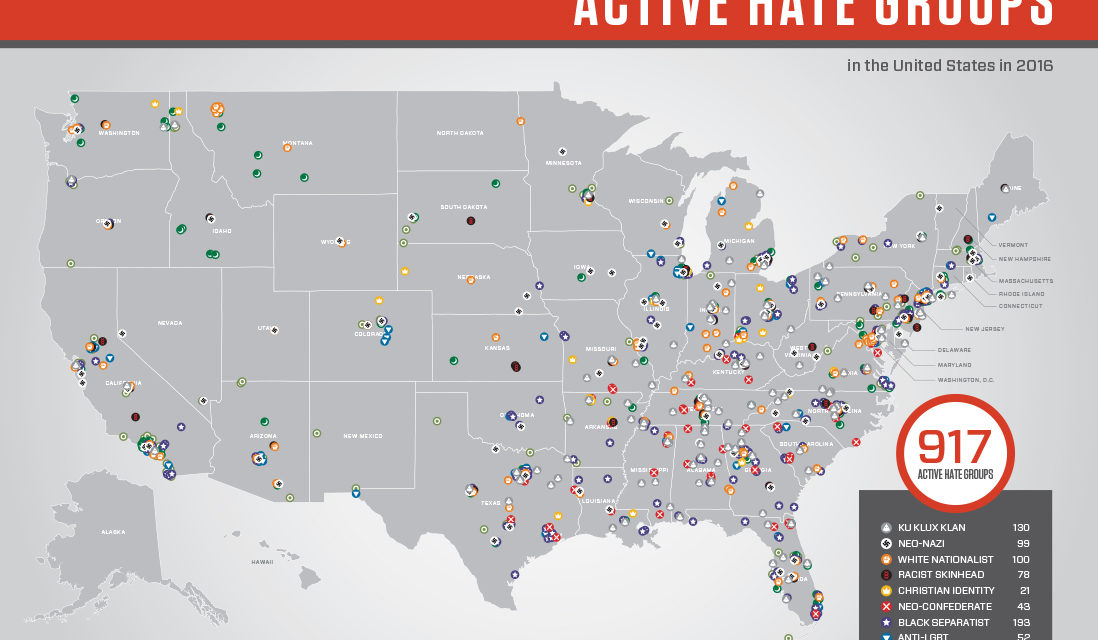The Southern Poverty Law Center’s annual mapping of organized hate in America reveals a dramatic spike in anti-Muslim groups.
By Deepa Iyer
ColorLines, February 16, 2017 —

The 2016-2017 map of active hate groups by state, developed by the Southern Poverty Law Center (SPLC) Illustration: Southern Poverty Law Center
President Donald Trump’s vilification of immigrants and Muslims during his candidacy and presidency has electrified parts of the radical right, according to the Southern Poverty Law Center’s (SPLC) annual census of organized hate groups and extremist organizations, released on February 15. The SPLC finds 917 hate groups operating in the United States, including the Ku Klux Klan and their variants, White nationalist groups, antigovernment or “Patriot” groups, “Black separatist” groups, and groups that harbor strong views against LGBTQ, Muslim, immigrant communities and the racial demographic changes in the United States.
Donald Trump’s rhetoric and policies targeting vulnerable populations present moments of political opportunity for the radical right, according to Mark Potok, senior fellow at the SPLC.
“The alt-right is rebranding White supremacy for public relations, dressing up Ku Klux Klan ideas in suits and ties rather than robes,” Potok said on a press call.
“The radical right has a chance now than any other time in American history to effect real-life policy.”
Four new groups, including Identity Evropa, American Vanguard, The Right Stuff and The Daily Stormer, were created or became more active since Trump ran for office.
The biggest takeaway from the SPLC report is that organized anti-Muslim groups have nearly tripled in number, from 34 in 2015 to 101 in 2016, representing a 197 percent increase. The SPLC cites a number of factors to explain this growth: Trump’s anti-Muslim rhetoric, the refugee crisis, the well-funded Islamophobia industry that fuels anti-Muslim sentiment, and terrorist attacks such as the June 2016 massacre at Orlando’s Pulse night club committed by a man who allegedly pledged allegiance to ISIS.
The rise in anti-Muslim groups is not altogether surprising given the broader, long-standing climate of targeting Muslim communities in America. For example, the FBI found that anti-Muslim hate incidents had risen by 67 percent in 2015.
In the wake of the presidential election, the SPLC documented 867 bias-related incidents during the first 10 days after the election, many of which targeted immigrants or Muslims.
These findings mirror the grave concerns of groups that monitor hate crimes and xenophobic rhetoric targeting Muslim, Arab and South Asian communities, including the Council on American-Islamic Relations, Muslim Advocates and South Asian Americans Leading Together.
The SPLC report also notes that anti-LGBTQ groups are hoping that the political moment creates opportunities to roll back LGBTQ equality, especially at the state level. The SPLC documented at least 26 murders of trans people in the past year, and found that trans women of color are most victimized by violent hate crimes.
In addition, the report finds that what it calls “Black separatist” groups have increased, from 113 in 2014 to 193 in 2016. The SPLC defines the groups as those that “typically oppose integration and racial intermarriage, and … want separate institutions—or even a separate nation—for [B]lacks.” In response to a query from Colorlines about the inclusion of groups such as the Nation of Islam, Potok noted that “The SPLC understands and acknowledges that the majority of anti-White Black racism in America is a result of centuries of systemic White racism towards Blacks.” But, he says, “We would dishonest if we gave a pass to Black groups that are organized around hatred towards Whites, Jews or LGBTQ communities.”
Which groups operate in your state? Check out the interactive SPLC Hate Map here.












